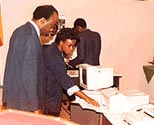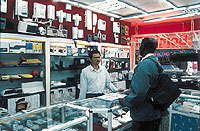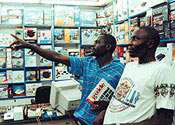Single Entry Visa for East Africa
The East African Community (EAC) plans a single visa for tourists to travel to all countries in the region. The new move will prove beneficial for business...
While many write off Africa as the continent of despair, other enterprising individuals and organisations have recognised the huge, untapped potential of Africa and are actively pursuing business ventures across the continent.
The biggest challenge to doing business in Africa is to find
the right information
and understnding the real nature of the many misnomers attached to the
continent’s name. Of course, there are many
problems in Africa, but none of these challenges are insurmountable. In fact, some
entrepreneurs consider Africa as a
much safer and lucrative place to do business that even North America.
information
and understnding the real nature of the many misnomers attached to the
continent’s name. Of course, there are many
problems in Africa, but none of these challenges are insurmountable. In fact, some
entrepreneurs consider Africa as a
much safer and lucrative place to do business that even North America.
Africa is the world’s second largest continent after Asia and has 54 independent countries with an estimated total population of 700 million. Indeed it is a hugely untapped market that remains hungry for new products and services – thus providing a wide range of business opportunities for enterprising businessm people.
The economic powerhouse of Africa south of the Sahara Desert is South Africa. Through its well developed infrastructure and deepwater ports, South Africa handles much of the trade for the whole southern African region. In 1970 its immediate neighbours, Botswana, Swaziland and Lesotho, and latterly Namibia, signed the Southern African Customs Union (SACU) enabling them to share in the customs revenue from their trade passing through South African ports.
In order to counter the economic dominance of South Africa in the southern African region, the countries to the north of it organised themselves into the Southern African Development Conference (SADC). Member states include those of the SACU as well as Angola, situated north of Namibia, and it’s oil-rich enclave of Cabinda, and Mozambique on the east coast, and the countries of south-central Africa, Zimbabwe, Zambia and Malawi.
The eastern region of Africa is home to the great wildlife reserves of the Serengeti plains and the Rift Valley lake system which stretch across the countries of Kenya, Uganda, and Tanzania. These countries signed the Treaty for Enhanced East African Co-operation to allow for the free flow of goods and people.
 Further north
lie the countries of the Horn of Africa and the source of the longest river in the
world, the Nile River, which flows northwards
over 6690 kilometres to end in the Mediterranean Sea. Somalia occupies much of the
coastline, while Ethiopia and Sudan are large
inland countries. On the coast of the Red Sea are the two independent republics of
Djibouti and Eritrea.
Further north
lie the countries of the Horn of Africa and the source of the longest river in the
world, the Nile River, which flows northwards
over 6690 kilometres to end in the Mediterranean Sea. Somalia occupies much of the
coastline, while Ethiopia and Sudan are large
inland countries. On the coast of the Red Sea are the two independent republics of
Djibouti and Eritrea.
The small landlocked central African countries of Rwanda and Burundi form part of an economic union of countries in the central African region. Other members of the Economic Community of Central African States are Cameroon, the Central African Republic, Chad, Equatorial Guinea, the oil-rich Congo and Gabon and the vast country of the Democratic Republic of Congo.
The Economic Community of West African States (ECOWAS) is a solid geographical bloc of 15 states from Nigeria in the east to Mauritania in the west. The countries of Mauritania, Mali and Niger are located in the southern stretch of the Sahara Desert while the remaining countries are splayed out along the coast line.
As a result of their respective colonial histories, these countries are divided into French and English-speaking states. The francophone countries include the republics of Benin, Burkina Faso, Togo, the Ivory Coast (Côte d'Ivoire), Guinea and Senegal while the remaining states of Nigeria, Ghana, Liberia, Sierra Leone, and the Gambia have English as their official language. The Republic of Guinea Bissau is a Portuguese-speaking state to the south of Senegal.
North of the Sahara Desert lie five predominantly Muslim countries
all bordering 
In a matter of few years, the continent of Africa has emerged as one of the fastest growing markets in the world. Imports into Africa have risen by around seven per cent annually for the last 20 years. At this rate of growth, purchases by African countries would reach an estimated $500 billion in the next 20 years. Not surprisingly, the international community is now turning its focus on developing and nurturing this huge market of over 770 million inhabitants.
Previous NextThe East African Community (EAC) plans a single visa for tourists to travel to all countries in the region. The new move will prove beneficial for business...
Uganda Business Council (UBC) aims to further strengthen trade and business ties between Uganda and Dubai by helping bring together the business communities...
Abu Dhabi Group expands operations in key African markets. Invests $250 million in Uganda and DR Congo. Investments in Africa from the Middle East are increasing...
Download the Africa Business Directory in Excel format and contact buyers, importers and companies in Africa directly from your desktop...
Download the UGANDA BUSINESS DIRECTORY and contact importers in Uganda, exporters in Uganda, wholesalers in Uganda as well as companies...
Many Arab investors are keen to invest in African countries that provide attractive returns of investments. Many countries in the Middle East have been investing...
The East African Community (EAC) plans a single visa for tourists to travel to all countries in the region. The new move will prove beneficial for business...
Uganda Business Council (UBC) aims to further strengthen trade and business ties between Uganda and Dubai by helping bring together the business communities...
Abu Dhabi Group expands operations in key African markets. Invests $250 million in Uganda and DR Congo. Investments in Africa from the Middle East are increasing...
Download the Africa Business Directory in Excel format and contact buyers, importers and companies in Africa directly from your desktop...
Download the UGANDA BUSINESS DIRECTORY and contact importers in Uganda, exporters in Uganda, wholesalers in Uganda as well as companies...
Many Arab investors are keen to invest in African countries that provide attractive returns of investments. Many countries in the Middle East have been investing...
The East African Community (EAC) plans a single visa for tourists to travel to all countries in the region. The new move will prove beneficial for business...
Uganda Business Council (UBC) aims to further strengthen trade and business ties between Uganda and Dubai by helping bring together the business communities...

